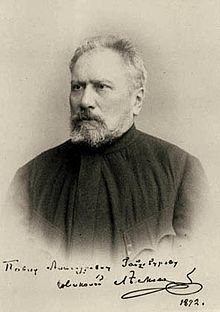The unbaptized priest
The unbaptized Pope ( Russian Некрещеный поп , Nekreschtscheny pop ) is a short story by the Russian writer Nikolai Leskov , which appeared in the St. Petersburg newspaper Graschdanin in 1877 . The story is said to be based on a similar incident in the Zhytomyr district of Ukraine .
Tolstoy let himself be inspired by reading the unbaptized priest for his own little folk tales.
The unbaptized Pope father Sawwa exercises the office of village priest on the right side of the Dnepr in his home village Paripsy to the full satisfaction of the Cossacks living there and is in the highest esteem.
content
Sawwa's father, the rich Cossack Petro Sakharovich, called Dukatsch, was considered daring and contentious when his son was not yet born. He had done no one in the village any good. Many had experienced considerable suffering from him.
Due to the childlessness of his marriage, the ducach had taken his orphaned nephew Agap into the house and taught him to fear. Even as a 40-year-old, Agap had great respect for his uncle. When the Ducatsch does become a father in old age, he signals to the intimidated nephew that the big inheritance is over. Agap is allowed to be the godfather of the newborn because no one in Paripsy wants to do the ducatsch this favor. Now the defiant Ducatsch does not want to have the newborn son baptized in his home village, but in the neighboring village of Peregudy, eight werst away. The ducatsch wins the Paripsy midwife Christja Kerassivna as godmother. This married woman is considered a witch because, as almost everyone in the village had seen, she had fooled her husband, Kerassenko, by a goblin and turned him into a demon . The midwife got along extremely well with the Peregudyer Popen Jerjoma, a scribe, as well as with representatives of the male world in general. So the godfather and godmother drive the newborn baby to Popen Jerjoma in a horse-drawn sleigh. The ducatsch gave the midwife a coat that was lined with a wide blue rabbit fur, depending on the season. Secured in it, the baby slumbers on the midwife's bosom. As the sleigh leaves the village, the Paripsy gawkers admire the hare-fur sleeves of that coat. The three do not reach Peregudy in the snowstorm, but get stuck in a woe in the steppe .
The extremely worried Ducatsch went on a search and fell into a shoveled grave in the blown Paripsyer cemetery. Back home without success, the ducach has to endure the whining of his superstitious wife. He must immediately do something about the misfortune that threatens the newborn: slain a living being and throw it into the grave. The Ducachha suggests a sheep as such a sacrifice. The ducach, an experienced hunter, kills a hare on the edge of the steppe, he says. The shotgun tears the face of the snow-covered nephew Agap. Sagittarius had mistaken the midwife's fur on the snowdrift for a hare. The trial is charged with murder. After three years of legal proceedings, the ducatsch was released because the Paripsyans had finally interceded for the unfortunate.
From then on, the ducach repented in a monastery. Meanwhile, the Dukachikha is raising her little boy solo. The midwife had told the parents that the child had been baptized with the Cossack name Sawwa. The boy becomes a priest. Years go by. The Ducatsch dies. At the age of thirty-five, Sawwa learned that he was not baptized. The bishop in the provincial capital knows of the merits of his subordinate Sawwa. Then His Eminence comes to pass the confession of the dying midwife: A snowflake had melted on the forehead of the snow-covered newborn. The midwife drew a cross on the baby's face with the water droplet and said the baptism.
reception
- 1969: Reissner is reminded of Gogol's evenings in the hamlet near Dikanka as he reads it . Turbulent events and bizarre incidents are so entertaining that after this lesson the reader hardly feels instructed on the topic: Which person looks exemplary?
German-language editions
- The unbaptized priest. An unlikely event. Almost a legend. German by Hartmut Herboth. P. 513-576 in Eberhard Reissner (Ed.): Nikolai Leskow: Collected works in individual volumes. The enchanted pilgrim. 771 pages. Rütten & Loening, Berlin 1969 (1st edition)
- The unbaptized priest. An unlikely event. Translated from the Russian by Ruth Hanschmann . P. 128–204 in Nikolai Leskow: The way out of the dark. Stories. 467 pages. Dieterich'sche Verlagsbuchhandlung, Leipzig 1972 (Dieterich Collection, Vol. 142, 3rd edition)
Used edition
- The unbaptized priest. An unlikely event. Almost a legend. German by Hartmut Herboth . Pp. 198-259 in Eberhard Dieckmann (ed.): Nikolai Leskow: Collected works in individual volumes. 4. The unbaptized priest. Stories. With a comment from the editor. 728 pages. Rütten & Loening, Berlin 1984 (1st edition)
literature
- Epilogue. From Rudolf Marx . P. 335–389 in Nikolai S. Leskow: At the end of the world and other stories. Dieterich'sche Verlagbuchhandlung, Leipzig 1968 (2nd edition)
Web links
- The text
- Entry in the Laboratory of Fantastics (Russian)
- Entries in WorldCat
